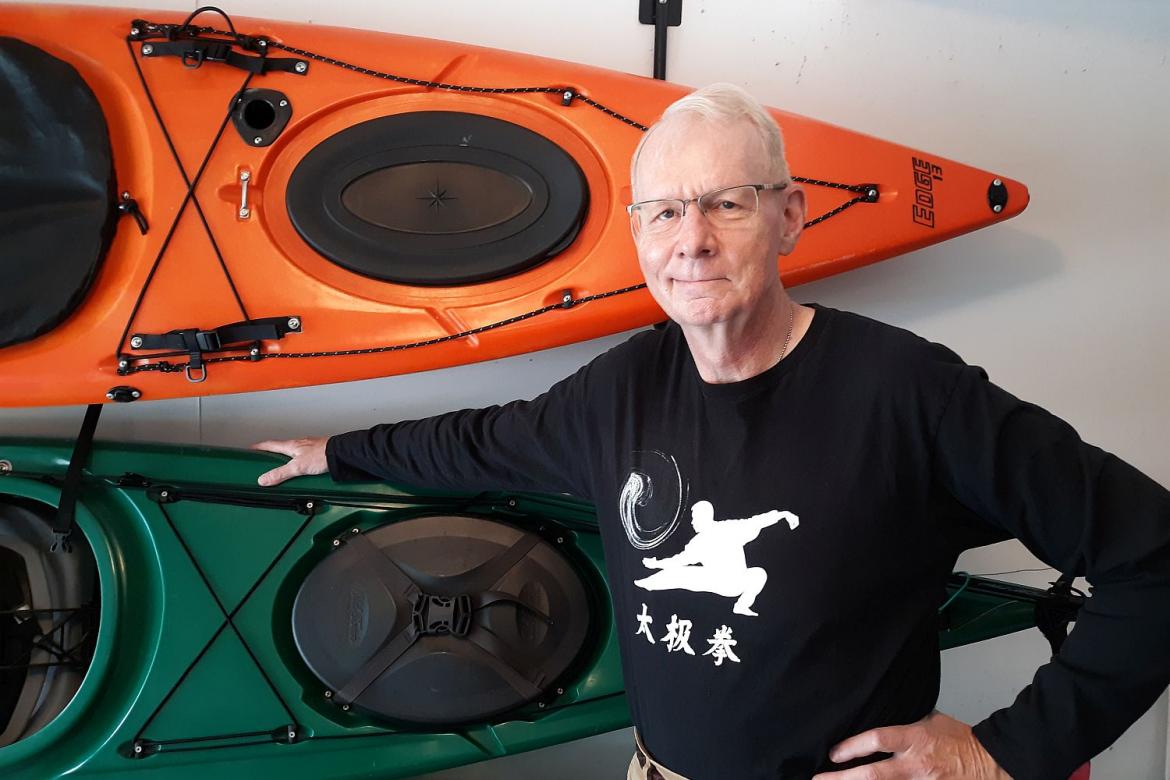
Pete Johnson
May 11, 2021
Being a volunteer trip leader is, in many ways, the culmination of the interests, skills, and experiences Pete Johnson has cultivated over the course of a full life in the United States and abroad. He traces his earliest interest in conservation to the fourth grade, when he read Rachel Carson's Silent Spring, a classic of the 20th century environmental movement. As a young adult, Pete joined the U.S. Army and spent years working as an intelligence officer in light infantry, armored cavalry, Special Forces, and embassy assignments around the world, where he developed a deep appreciation for foreign cultures and learned to speak several languages. It was in the army that he learned to kayak, a lifelong passion that he shares with his wife, Ilene, who is a Red Cross water safety instructor. "Being at water level gives you a feeling of floating and peace," he says. "You move quietly with animal life and can intuit how things help and harm water ecosystems." He is also a longtime member of the Sierra Club Georgia Chapter and is heavily involved as a local Outings leader and advocate for the environment.
So it's no surprise that Pete gravitated toward Sierra Club Military Outdoors, a national campaign to establish connections to the outdoors among veterans and their families and to inspire them to become outspoken champions for environmental conservation and justice. Beginning in 2016, Pete joined other veterans from around the country on a series of Military Outdoors trips, forming connections over their shared experiences and passion for nature. "Some of our outings have been like family reunions of people who served and immediately find a bond," Pete explains. One of these veterans is Lornett Vestal, the Southeast coordinator for Military Outdoors, who lives nearby. The two became good friends and teamed up to plan and lead outdoor adventures for the veteran community, including hikes, river trips, and a March for Peace event with refugee kids of high school age living in Atlanta.
"Let's get outside, get to know each other, and tackle the world's problems at the same time!"
As their relationship has grown, Pete and Lornett have found increasingly creative ways to connect veterans with the natural world and other opportunities for healing that dovetail with their own backgrounds and interests. For instance, Pete co-led a conservation walk for veterans and their families around his hometown of Atlanta, featuring stories about the changing face of the city and the creation of outdoor space the Atlanta BeltLine, followed by a trip to one of his favorite restaurants for a taste of authentic southern cooking. For another project, Lornett enlisted a local yoga studio to provide free classes in therapeutic yoga to a group of veterans. "The ways we can cross-connect are endless," Pete says.
In recent years, Pete has come to see a parallel between the work he's doing with veterans and the larger problems facing the country. Citing generations of disparities among America's most marginalized populations, he believes that the Sierra Club must expand its conservation mission by embracing social, economic, and environmental justice for all. "Flint, Michigan, was a neon warning sign," he explains, "that highlights how underserved communities are being killed by a lack of clean air, water, and soil." This has been particularly apparent during the COVID-19 pandemic, which has brought many of these disparities into stark relief by throwing thousands of American workers into increasingly precarious circumstances. "I was struck by the first photos of hospital workers coming off shifts with a thousand-yard stare that you often see in combat veterans," Pete recalls. "Those who survived have endured moral injury and seen horror." So have hospital staff. "They are the nation's tragic new cohort of PTSD sufferers." Lornett remembers Pete being especially heartbroken by the local and national response to the pandemic. He credits Pete as the force behind their new initiative, the Vets for Essential Workers campaign, which aims to help veterans and military families advocate for essential workers and frontline medical personnel to help them access the benefits and gear they need to fight the virus.
The pandemic has undoubtedly slowed Pete down—he's been able to join only virtual outings this past summer—but it hasn't gotten in the way of his plans to serve the community while enjoying the outdoors. It's only a matter of time before Pete returns to business as usual: teaching veterans' families to kayak or raft while telling jokes and anecdotes from his days abroad, and advocating for increased access to the outdoors for those who need it the most. Or, as he summarizes his mission, "Let's get outside, get to know each other, and tackle the world's problems at the same time!"
Learn more about Sierra Club Military Outdoors at sc.org/military.
